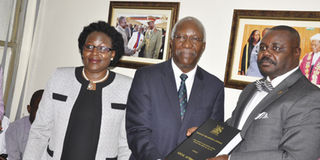Auditor general report reveals financial losses in government departments

Deputy speaker of parliament Jacob Oulanyah (R) receives the 2015 annual report from auditor general John Muwanga and his deputy, Ms Keto Nyapendi Kayemba (L), at Parliament yesterday. PHOTO BY Geoffrey Sseruyange
What you need to know:
For instance, government failed to spend more than Shs217.3b and government entities returned more than Shs9.4b. Most affected service delivery areas were road construction, agro-processing, household income improvement, health and education services
PARLIAMENT.
The Auditor General’s Office yesterday released a new report, showing a trend of financial indiscipline in government departments resulting in either the loss of, or failure to account for billions of shillings.
Auditor General (AG) John Muwanga also found that during the year under review (2013/14), at least 10,486 students of Kyambogo University were admitted without applications. The AG said, this was irregular and asked Parliament to investigate the abuse of procedures and the corruption in the admission of students.
“There is need for government to seriously address the matters highlighted in the report. We noted areas of wasteful expenditures, poor absorption capacity and unaccounted for funds. All these have affected service delivery,” Mr Muwanga said.
Under local governments, expenditures amounting to more than Shs9b remain unaccounted for. As a result, the auditors could not confirm whether the funds were used for intended purposes. The delayed submission of accountability, the AG said, may also lead to falsification of documents resulting in loss of public funds.
The auditors also found that 32.3 per cent of all positions in local government are vacant, something that has affected service delivery in the country.
In the area of mining and exploration, the auditors found that 174 companies whose licences had expired faulted on arrears in royalties amounting to more than Shs850m. Further, 17 licence holders had not provided the required records and audited financial statements to Ministry of Energy.
The report was presented to Deputy Speaker Jacob Oulanyah who asked the leaders of the House accountability committees to put officials implicated to task.
The audit found that during the year under review, contingent liabilities in respect of cases before court under ministry of Justice rose from Shs2.2 trillion to Shs4.3 trillion, signifying an increase of 95 per cent. This figure excludes potential cases involving intents to sue government.
“This situation is untenable and likely to create an additional burden on the public resources,” Mr Muwanga said.
Accumulating court bills
Mr Muwanga said unsettled court awards and compensations have also continued to accumulate over the years, rising from Shs54b in 2012 to Shs164b in 2013 and Shs442b in June 2014.
The AG said accrued interest on account of government’s non-payment due to inadequate budget provisions has made matters worse. Due to inefficiencies, the audit also highlighted under absorption capacity in various government agencies.
For instance, government failed to spend more than Shs217.3b and government entities returned more than Shs9.4b. Most affected service delivery areas were road construction, agro-processing, household income improvement, health and education services.
The audit highlighted delayed contracts, redundant Shs25b for teachers Savings and Credit Cooperatives (Sacco) Fund, increased land grabbing, congested prisons and unsettled electricity bills. The Auditor General said all these negatively impacted on service delivery.



